In his track “Hungry Heart” from his breakthrough 1980 album “The River”, Bruce Springsteen sings of an adventure that takes him away from home but prevents him from returning. As the first verse tells us, “Like a river that don’t know where it’s flowin’, I took a wrong turn and I just can’t go home”. As my time in Moscow quickly winds down, I feel a desire to stay in Moscow and continue to learn and live – the ironic part of this journey is that just as I feel like I am making my biggest strides in using and understanding Russian, it is almost time to leave. But alas, this is only an incentive for me to return to Russia in the near future.
Yesterday, I finished my classes for the summer semester at Moscow International University. A grammar exam, oral exams, and a couple of essays marked the culmination of 7 weeks of coursework. Next week, our group will spend 3-4 days on a cruise around Lake Ladoga, visiting the towns of the scenic Republic of Karelia (a semi-autonomous republic in northwest Russia that has more sovereignty in local matters than other oblasts). We will also have a day before and after the cruise that we will spend in St. Petersburg.
Before I cover some of my adventures from the past 10 or so days, I wanted to share my thoughts about a very important cultural holiday here in Russia – Victory Day (День Победы), celebrated on May 9. Just like V-E Day on May 8, День Победы celebrates the victory of the Allied Coalition against Germany in the Second World War. However, more importantly, this day also commemorates the millions of Soviet soldiers who lost their lives in their Great Patriotic War (Великая отвечественная война). As a result, this day is especially important to all Russians. Every year in Moscow there is a parade featuring surviving veterans and a concert, but in contrast to the celebrations, there are flowers and wreaths presented solemnly at the monuments to the victims of the war – civilians and soldiers alike.
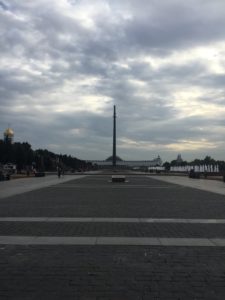
I had the chance to ask one of my Russian friends about this holiday and journeyed with her to Victory Park (Парк Победы), a gorgeous and solemn display of monuments to the victims of the war amidst green rows of trees. Among the monuments are a memorial synagogue and a sculpture dedicated to the victims of the Holocaust. Another statue features four figures, one from each of the main Allied Powers – Great Britain, France, the Soviet Union, and the United States. The main statue of the park is a huge, painstakingly detailed obelisk with a sculpture of St. George (the patron saint of Moscow) on horseback.
Perhaps it is this similarity between Russia and the United States – a shared legacy of the wartime service of millions of citizens – that we find the greatest reminder of our common humanity. My friend and I shared our stories of relatives’ service – her great-grandfather fought in the war, while both of my grandfathers served on the Pacific front. She told me that veterans would often come to schools and talk about the war, but like many American veterans they rarely spoke about details. Like many other Russians, Victory Day and its historical significance are incredibly important for her, and she says that it is actually her favorite holiday.
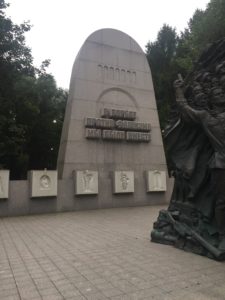
One of my professors at the university also lectured about Victory Day and its significance, especially about the losses that the day represents. Every Russian family at that time sent at least one family member to thewar, and many sent more – sons, brothers, husbands, fathers. My professor actually showed us some letters that her father sent home from the war front, filled with encouraging and affectionate language. Unfortunately, most did not survive, and these huge losses are on a scale unimaginable to Americans. Most of these losses actually come from civilian deaths, thanks to invasion and siege. We still don’t know the official extent of Soviet losses, as declassification of Soviet documents means an ever-changing estimate, but perhaps as many as 11 million soldiers and probably more than 25 million citizens perished during the war. My professor personally relates to these losses, as her youngest brother was sadly killed during the war near Stalingrad.
As a result, День Победы remains a crucial memorial to the service and sacrifice of millions of Soviet citizens and is also a source of great national pride. Regardless of opinions of the Soviet regime, Russians celebrate this day because nearly every family can relate to its significance. Парк Победы is a beautiful reminder of this national pride and sorrow, inevitably intertwined in the Russian mentality.
On a lighter note, I had the chance this past weekend to visit two old Russian cities: Tula and Vladimir (I didn’t have the chance to visit Sergiev Posad on Sunday). Let’s look at these and other adventures:
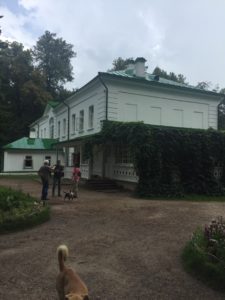
- Tula (Тула) and Tolstoy’s Estate (Ясная Поляна): Last Friday, our group traveled via bus to Leo Tolstoy’s residence not far from the old city of Tula. His estate sits quietly among the fields of provincial Russia, about three hours by bus away from Moscow. We toured the scenic property and his home. Afterwards, we stopped in the city of Tula, known for its samovar museum and small Kremlin. The interior of the Kremlin was lined with craft shops and bakeries, and in the center of the territory stands a church and museum.
- Vladimir (Владимир): On Saturday, some friends and I traveled by train to Vladimir, another ancient city northeast of Moscow. In the 12th and 13th centuries, the city served as the capital of medieval Russia but
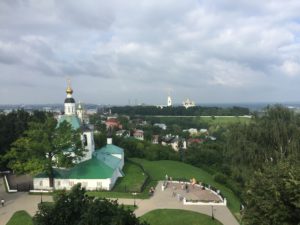
View of historic Vladimir, featuring 850-year old and 900-year old churches in the background and foreground, respectively declined in prominence after the Mongol invasion of 1237. In the 14th century, the grand princes moved their court to Moscow. Nonetheless, the town is full of history in its monasteries, churches, monuments, and its old entry gate. At least three churches date to the 12th century, and the old stone gate that stands in the center of the old town was built in 1166. We walked around the city, ate at several small cafes, and saw how life in the provincial cities differs from the hustle and bustle of Moscow. From the top of the hill and the deck of an observation tower, one can see the rolling hills and fields of the Russian countryside. To date, my day in Vladimir was my favorite of the trip.
- Speaking: Yesterday I had a really good day of speaking, first with some oral exams in the morning and then later with a Russian friend of mine and her friend. We walked around Парк Победы and then ate at a local cafe, and besides not always hearing the questions I understood how to respond. Furthermore, I was able to more competently talk about some American politics and history – in the past, I’ve tried this but it doesn’t usually go well. However, with some help on some vocab this time, I was able to convey my points and was understood, which I considered quite a personal victory. For sure I’m still making errors, but the major errors are rare and smaller errors are less frequent. I am more satisfied with my speaking ability than ever before, and more importantly I have the confidence to put myself in most everyday situations.
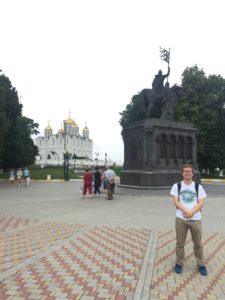
In short, I’ve had quite a few adventures in this past week – two new cities, many historical sites, and endless reasons to love Russia. I now realize that my personal gamble of spending two months in Russia was well worth the risks. Springsteen also sings in “Hungry Heart” that since “everybody’s got a hungry heart,” you should “lay down your money and…play your card”. Given this sentiment, I would say that for the first time, I truly gambled and played my cards. I took perhaps the biggest risk of my life, and now I am finally reaping the rewards of that decision.